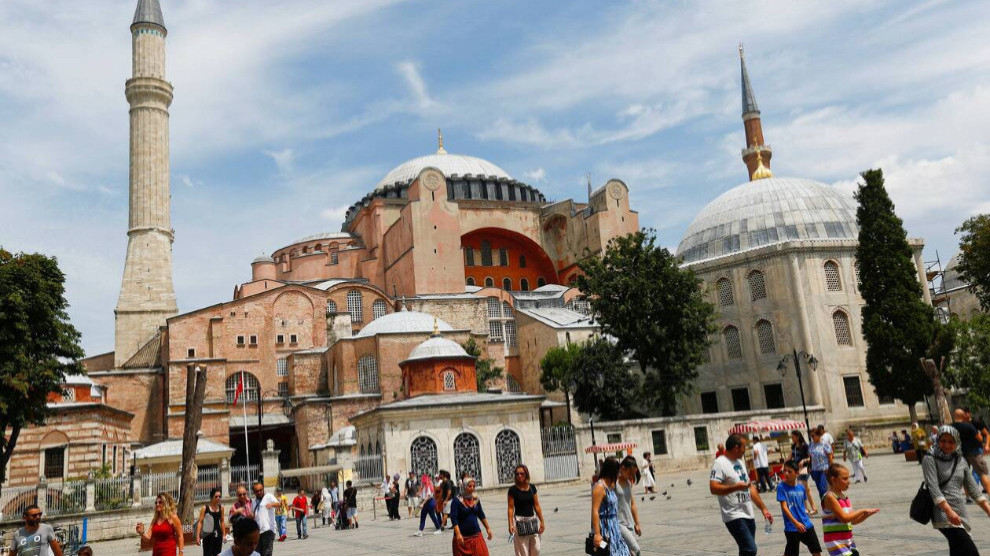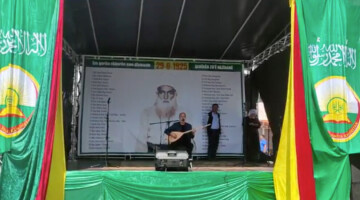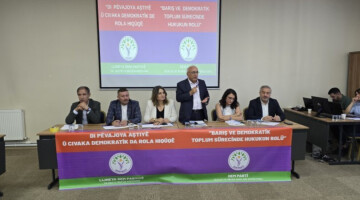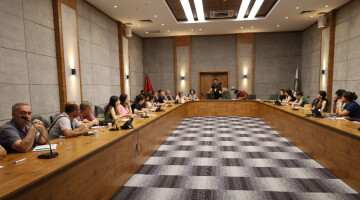The Executive Council of the Kurdistan National Congress-KNK reminded that Hagia Sophia, Turkish Ayasofya, Latin Sancta Sophia, also called Church of the Holy Wisdom or Church of the Divine Wisdom, cathedral built at Constantinople (now Istanbul, Turkey) in the 6th century CE (532–537) under the direction of the Byzantine emperor Justinian I."
By general consensus, it is the most important Byzantine structure and one of the world’s great monuments. After the city was captured by the Ottomans, in 1453, Constantinople became Istanbul and Hagia Sofia a mosque, Ayasofya. In 1935, under Mustafa Kemal Atatürk, it was turned into a museum.
But earlier this week a Turkish court annulled the site’s museum status, saying its use as anything other than a mosque was “not possible legally.”
The statement added: "While, Pope Francis confined himself to a few words on the issue: “My thoughts go to Istanbul. I think of Santa Sophia and I am very pained.” President Recep Tayyip Erdogan said the first Muslim prayers would be held in Hagia Sophia on July 24.
Hagia Sophia is hardly the first historic religious site to fall afoul of Erdogan’s discriminative actions. Since 2015, 800 buildings in the ancient district of Sur in the heart of the Kurdish city of Diyarbakir were razed. The damage became irreversible when the rubble was bulldozed and dumped in the nearby Tigris River."
The KNK reminded that "the flooding of the Hasankeyf is another example of Turkey’s barbaric actions against Kurdish populated areas. Hasankeyf was an ancient town and district located along the Tigris River in the Batman Province in southeastern Turkey. In 1981, Turkey declared it a natural conservation area. Despite local and international objections, the city and its archaeological sites have been flooded due to the completion of the Ilısu Dam. On 19 February 2020, the water level reached up to 479.30m elevation and rising. When water level rises above 483m Hasankeyf would be completely under water."
Indeed, by 1 April, water levels reached up to the elevation of 498.2m. Almost all of old city is under the water. The scheme will mean the flooding of 199 settlements in the region, thousands of human-made caves and hundreds of historical and religious sites. Also, close to 80,000 people have been displaced. Hasankeyf has been part of many different cultures in its long history, including ancient Mesopotamia, Byzantium and Arab empires, in fact some historical experts claim that the settlement predates all these civilisations.
The KNK added: "The list of monuments removed or destroyed are long and includes a mural to a dead Kurdish politician, stone reliefs depicting scenes from the historic Kurdish Marwanid kingdom, and plaques bearing the names of Kurdish children who were shot by security forces during the conflict.
Further, when a statue celebrating the 17th-century Kurdish writer Ahmedi Khani was destroyed in the city of Dogubeyazıt the state administrator claimed the destruction took place during road maintenance works, which in reality it is far from the truth. It is in fact a strategically plan to wipe the history of Kurds in the region. The destruction and annihilation of historic sites is evidence of Erogan’s extremist Islamic ideology, which in 1997 earned him a ten-month prison sentence for incitement to hate. Since coming to power, Erdogan has attempted to smoother his religious electorate. Erdogan is attempting to honour the decision of Ottoman Sultan Mehmet II who prayed in the Hagia Sophia at the take of Constantinople in 1453.
Erdogan’s Islam is an Islam of conquest. In Turkey, he aims to create a religious state and in neighbouring countries he sends his army to conquest."
Therefore, according to the KNK, "Erdogan, changing Hagia Sophia’s status appears to be a move to appeal to his base and assert his political brand — a strident nationalism inflected by his religiosity that anchors itself in a decades-old ideological struggle with more secular Turks. As a museum, the Hagia Sophia symbolized the idea of there being common artistic and cultural values that transcended religion to unite humanity. While, its conversion into a mosque is an all too appropriate symbol for the rise of right-wing nationalism and religious chauvinism around the world today. The stones, pillars and mosaics of Hagia Sophia embody the complexity of Turkish and European history, of the Christian and Islamic traditions. Its very existence is a rebuke to Erdogan’s attempt to cleanse history of that complexity, and to conjure a singular, mythical past."














